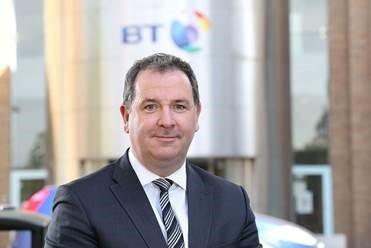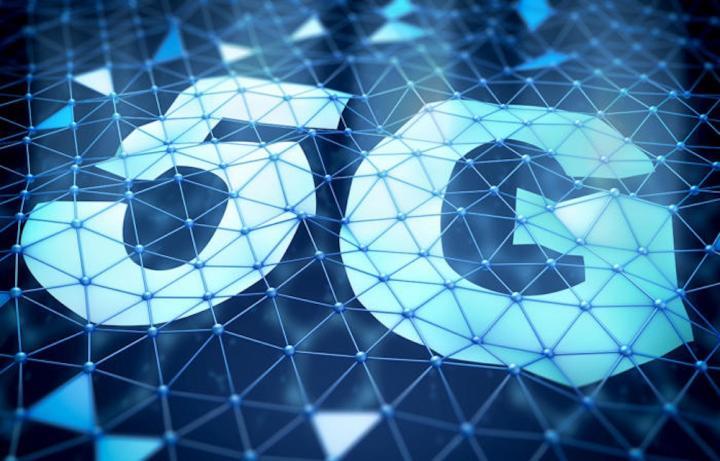
Written by Paul Murnaghan, Regional Director of BT Enterprise, Northern Ireland
Many of you may already have heard of driverless cars and the potential for shopping to be delivered via drones to your doorstep. These are just a taste of the technological advancements thanks to 5G, but there is less awareness of the impact it will have generally for consumers and businesses in Northern Ireland.
2019 has proved to be a landmark year in connectivity as we witnessed the first 5G networks begin to roll out across the world. In May this year, Belfast was one of the first 6 cities in the UK – and among the first in the world – to benefit from BT consumer arm, EE’s new 5G network.
Whilst 2019 has been focused on the introduction of the first 5G networks around the world, 2020 is expected to bring an entirely new host of possibilities. The conversation will shift from 5G availability to exploring how we use 5G to improve virtually every facet of life for consumers and businesses. So, what is 5G and what’s it going to mean for you in 2020 and beyond?

BT's Paul Murnaghan
Simply put, 5G means fifth generation mobile network. The first-generation network dates back to the 1980s, and if you remember using a mobile phone in the 90s and early noughties and thinking how wonderful it was to receive a text or picture message, you were benefitting from the advances of 2G technology.
The arrival of WI-FI, 3G and 4G over the past 20 years has fast-tracked the digital revolution, but we’re only on the periphery of what’s possible. In the future we’ll be using 5G increasingly to share content, stream video, game and communicate, demanding a fast and stable connection.
There will be more connected devices – not just phones, tablets and laptops, but household appliances such as kettles and refrigerators, and even our cars will be automated. All this places increasing pressure on the bandwidths delivered by today’s 3G and 4G services.
RELATED: The evolution of 5G across Ireland
What makes 5G such a powerful game-changer for both business and consumers alike are three key benefits: faster speeds, reliability and an instant connection. 4G is the current high-speed connectivity standard but 5G will bring speeds that are up to three times faster than 4G. It’s more reliable and allows greater capacity, which means more people can use it simultaneously. With 5G you’ll also get an instant low-latency connection, so everyday tasks feel really fast. Latency is the time between an action being performed (such as clicking a video link) and a reaction occurring (the video playing), as data travels between two points.

In reality businesses will be the first to benefit from the technology when more 5G enabled handsets and devices become available on the market.
At BT, we’ve already been looking at 5G industry applications where low latency will make a real difference. A good example is how it can be used for medical applications like remote surgery or procedures and we recently collaborated with the University Hospitals Birmingham NHS Foundation Trust to give a live demonstration of the UK’s first ultrasound scan carried out over a 5G link.
The demonstration simulated a paramedic, wearing a robotic or ‘haptic’ glove, performing an ultrasound scan on a patient, under the remote guidance of a clinician who was able to interpret the ultrasound image in real-time. The clinician used a joystick to send control signals over the 5G network to the glove worn by the paramedic, directing them where to move their han
The potential for this technology is huge and medical experts say it could bring significant benefits. As well as speeding up diagnoses for patients, it could reduce the number of ambulance journeys and emergency department visits. This will improve the overall experience for patients while freeing up ambulance resources and reducing pressure on emergency departments.

VR demonstrations at BT's 5G launch for Belfast Harbour earlier this year
We’ve been trialling 5G innovations here too. Working with Belfast Harbour, which has ambitions to become a "Smart Port", we’re looking at how 5G can both simplify and improve maintenance activity at the Port by delivering information directly to staff, when and where they need it, using 5G connected augmented reality (AR) headsets.
We’ve only just begun to tap into the transformative power of 5G, but our current projects, particularly with Belfast Harbour, are examples of just what can be achieved.
RELATED: Belfast Harbour uses 5G VR and AR to create "Smart Port" with BT
Belfast is fast becoming a one – stop shop for tech savvy citizens but the arrival of 5G here brings with it the power to create solutions beyond our imagination, transforming how we live and work, by bringing together people, places and information in innovative and meaningful ways we haven’t been able to do before.